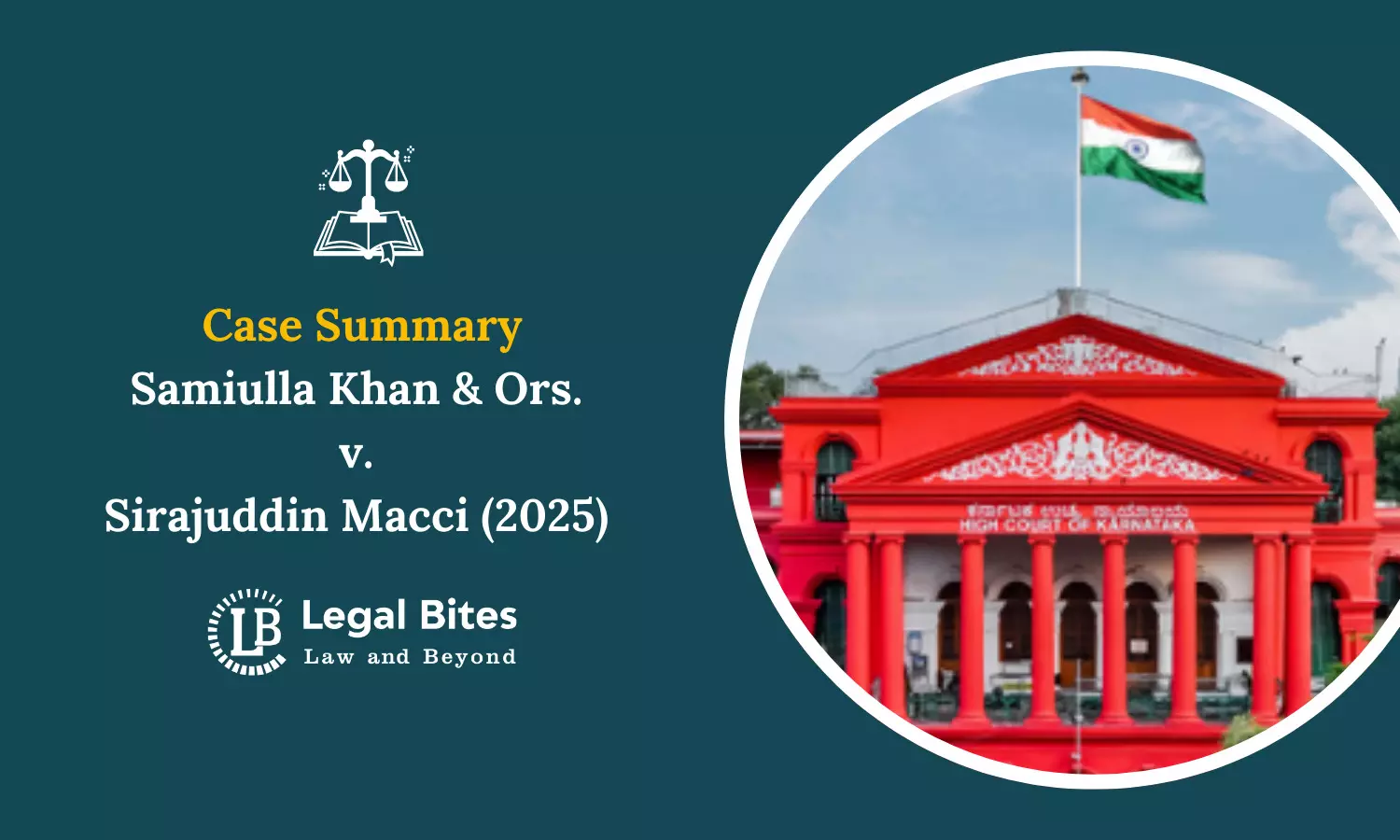Case Summary: Samiulla Khan & Ors. v. Sirajuddin Macci (2025) | Karnataka HC Urges Legislative Action on Uniform Civil Code
Karnataka High Court rules on property partition under Muslim law, modifies shares, and urges enactment of Uniform Civil Code to ensure equality.

This case, Samiulla Khan & Ors. v. Sirajuddin Macci (2025), decided by the Karnataka High Court, concerns a family dispute over the partition of properties owned by the late Shahnaz Begum. The plaintiffs, her siblings, claimed a share in her estate, while the defendant, her husband, asserted exclusive ownership. The Court examined the nature of property acquisition and succession under Mahomedan Law, ultimately modifying the share distribution and strongly advocating for the enactment of...
This case, Samiulla Khan & Ors. v. Sirajuddin Macci (2025), decided by the Karnataka High Court, concerns a family dispute over the partition of properties owned by the late Shahnaz Begum. The plaintiffs, her siblings, claimed a share in her estate, while the defendant, her husband, asserted exclusive ownership. The Court examined the nature of property acquisition and succession under Mahomedan Law, ultimately modifying the share distribution and strongly advocating for the enactment of a Uniform Civil Code in India.
Case Title: Samiulla Khan & Ors. v. Sirajuddin Macci
Court: High Court of Karnataka at Bengaluru
Citation: 2025:KHC:14374
Bench: Justice Hanchate Sanjeevkumar
Date of Judgment: 4th April, 2025
Facts of the Case
- The deceased, Shahnaz Begum, was a government school teacher who died intestate on 06.01.2014.
- She was survived by her husband (defendant) and three siblings (plaintiffs).
- The properties in question:
- Schedule ‘A’ property: Purchased via a registered sale deed on 03.12.1987.
- Schedule ‘B’ property: Purchased through a registered sale deed on 09.02.2010.
- Plaintiffs contended that both properties were self-acquired by the deceased, thus entitling them, along with the defendant, to inherit under muslim inheritance law.
- The defendant argued that the properties were purchased from his income, out of love and affection, in his wife's name, thus constituting benami transactions.
- The trial court in O.S. No. 25162/2019 partly decreed the suit, recognizing the plaintiffs' partial ownership of the properties. Both parties filed appeals challenging the extent of the shares decreed.
Issues Before the Court
- Whether the defendant made out a sufficient cause to condone the delay of 614 days in filing the cross-objection.
- Whether the properties in dispute were self-acquired by the deceased or purchased by the defendant and registered in her name.
- Whether the plaintiffs are entitled to a larger share than that granted by the trial court.
- Whether the trial court was correct in quantifying the shares of the parties in the suit's schedule of properties.
- Whether the parties are governed by Muslim Law or any other personal law for succession.
Decision on Delay
The Court condoned the delay in filing the cross-objection, acknowledging the defendant’s age (89 years), health issues, and financial hardship. The Court emphasized the importance of adjudicating the matter on the merits, especially where rights under personal law and inheritance were involved.
Key Findings on Property Ownership
Joint Acquisition of Property
The High Court found that:
- Both suit schedule properties were jointly acquired by Shahnaz Begum and the defendant.
- Schedule ‘A’ property was acquired while both were in government service.
- Schedule ‘B’ property was purchased after the defendant’s retirement, but he was drawing a pension, and both had income.
This reversed the trial court’s finding that Schedule ‘B’ was solely acquired by the deceased and corrected the share distribution.
Applicability of Muslim Law
The Court reaffirmed that:
- The parties were governed by the Muslim Personal Law, not the Hindu Succession Act.
- Under Sunni Hanafi principles:
- The husband (defendant) is a sharer.
- Brothers are also sharers.
- A sister (plaintiff No. 3) is a residuary, receiving half the share of each brother.
Thus, plaintiffs were entitled to a share only in 50% of the properties held by the deceased, not in the defendant's 50% exclusive share.
Modified Share Allocation
The Court held that the correct division of the two properties (both ‘A’ and ‘B’) should be:
- Defendant (husband): 3/4th share
- Plaintiff No. 1 (brother): 1/10th share
- Plaintiff No. 2 (brother): 1/10th share
- Plaintiff No. 3 (sister): 1/20th share
This division was based on a 50% exclusive share of the defendant (as joint purchaser), and the remaining 50% (belonging to the deceased) being distributed under Mahomedan Law.
Discussion on Uniform Civil Code
A significant portion of the judgment was devoted to the need for a Uniform Civil Code (UCC) under Article 44 of the Constitution. Justice Hanchate Sanjeevkumar, while acknowledging the constitutional protection of personal laws, observed:
- The differential treatment under Mahomedan Law, particularly regarding gender equality, creates discrimination (e.g., the sister’s lesser share compared to brothers).
- Hindu daughters, post the 2005 amendment to the Hindu Succession Act, enjoy equal rights with sons, unlike under Muslim Law.
- He emphasized that marriage under Muslim law is a civil contract, not a sacrament, and hence property rights cannot be based on emotional arguments like "union of two souls".
Judicial Advocacy for UCC
The Court cited:
- Dr. B.R. Ambedkar’s speech in the Constituent Assembly in favour of UCC.
Landmark judgments:
- Mohd. Ahmed Khan v. Shah Bano Begum (1985) 2 SCC 556
- Sarla Mudgal v. Union of India (1995) 3 SCC 635
- John Vallamattom v. Union of India (2003) 6 SCC 611
Court’s Recommendation
The Court requested the Registrar General to forward a copy of the judgment to:
- The Principal Law Secretary, Government of India, and
- The State of Karnataka,
...with a recommendation to consider legislation on Uniform Civil Code in the spirit of Article 44 and the Preamble of the Constitution (Justice, Equality, Fraternity, Unity).
Conclusion and Final Order
- RFA No. 935 of 2020 (plaintiffs’ appeal): Dismissed
- RFA.CROB No. 33 of 2023 (defendant’s cross objection): Allowed in part
Modified Decree:
- Plaintiff Nos. 1 and 2: 1/10th share each in suit schedule ‘A’ and ‘B’.
- Plaintiff No. 3: 1/20th share in suit schedule ‘A’ and ‘B’.
- Defendant: 3/4th share in both the suit schedule ‘A’ and ‘B’.
No costs were awarded. The High Court Legal Services Committee was directed to pay the Amicus Curiae as per the rules.
Significance of the Judgment
This judgment is notable for:
- Clarifying joint ownership under Muslim Law in the context of a husband purchasing property in his wife’s name.
- Rectifying an error in the trial court's quantification of inheritance shares.
- Making a strong judicial pitch for the implementation of a Uniform Civil Code, supported by constitutional philosophy, precedents, and legislative history.
- Critiquing religious personal laws that perpetuate inequality, especially gender discrimination.
- Suggesting that parliamentary and state legislative bodies take proactive steps toward enacting the UCC.
Click Here to Read the Official Judgment

Ananya Gupta
Ananya is an alumnus of the prestigious Government Law College, Mumbai, specializing in Corporate Law. A passionate legal scholar, she is deeply involved in research, focusing on corporate governance and regulatory frameworks.
